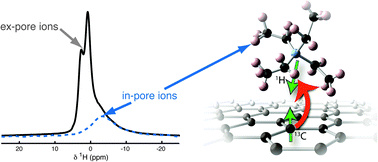
A group of Scientists from the UK, Germany, the USA and France have used NMR spectroscopy to systematically study ion adsorption in porous carbide-derived carbons. Their results provide insight into the different electrolyte environments present in the carbon, and how they are affected by pore size. The group, led by Prof. Clare Grey, also explored the effects of sample orientation, and developed 13C-1H CP NMR experiments to select the ions adsorbed in the pores.
These techniques presented in their recent PCCP paper will be useful for future investigations into adsorption on porous carbons.
Read this HOT article today:
Nuclear magnetic resonance study of ion adsorption on microporous carbide-derived carbon
Alexander C. Forse, John M. Griffin, Hao Wang, Nicole M. Trease, Volker Presser, Yury Gogotsi, Patrice Simon and Clare P. Grey
DOI: 10.1039/C3CP51210J










